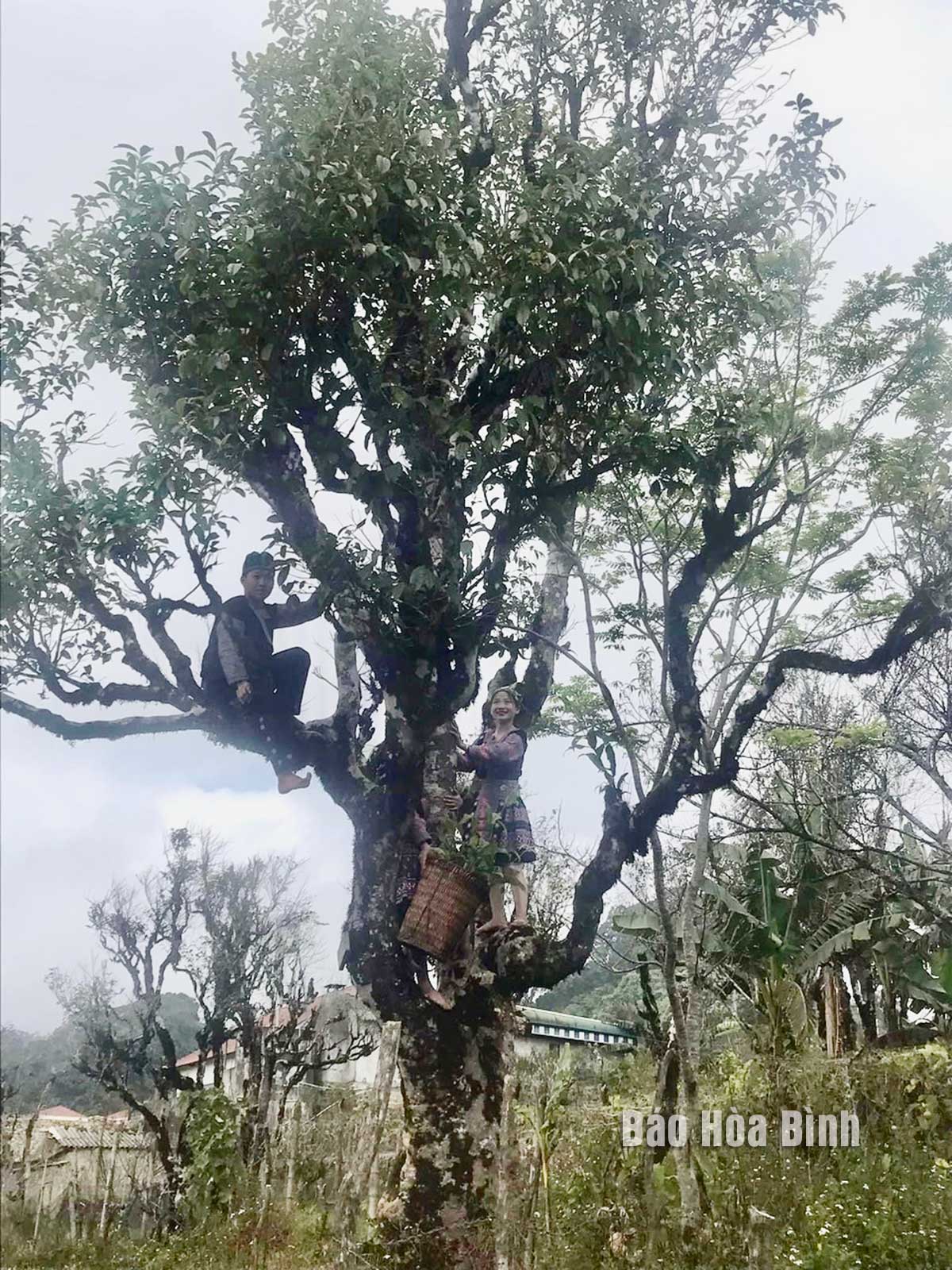
In Pa Co commune of Mai Chau district, apart from 82ha of 'shan tuyet' teas grown several decades ago, there are also ancient plants aged more than 100 years, mostly in Pa Hang Lon and Pa Co hamlets. The local tea with its distinctive flavour has become a consumer preference. Besides, the ancient plants are also favourite check-in places of tourists at present.
Residents in Pa Co hamlet in Pa Co commune, Mai Chau district, harvest 'shan tuyet' tea buds from old plants.
Pa Co commune is blessed with a cool climate,
foggy and cold winter, and high humidity in forest, which are favourable
conditions for teas to grow and acquire special quality. In its Pa Hang Lon hamlet, the ancient plant
area is surrounded by forest. Villagers said most of the ancient plants here
are more than 100 years old.
Mua A Senh, a 93-year-old man in Pa Hang Lon
hamlet, said the plants grow wildly, and no one knows when they came into
being. In the past, people often picked and dried fresh buds to use as a daily
beverage and as a gift for distinguished guests. Tea has formed part of the
daily life and culture of the local Mong ethnic people for hundreds of years,
and drying tea is also a craft dating back that long.
The ancient plants in Pa Co commune belong to
the variety of 'shan tuyet', whose buds are covered with as-white-as-snow hairs
that still remain even after being dried. Taking a sip of the clear yellow
drink, people can feel its light bitter and fragrant taste with sweetness still
lingering for a long time.
Sung A Pao, a resident in Pa Hang Lon hamlet,
said that previously, tea plants grew wildly and some were even 6 metres high.
Later, realising consumers’ preference for tea from ancient plants, locals have
boosted organic practices to care for the plants. They do not use pesticide or
chemical fertiliser so as to retain the tea’s natural flavour.
Villagers have to stand on ladders to pick the
buds on the tips of high and long branches of big ancient plants. Every year, a
plant could be harvested for three times, each of which people can pick 10 -
13kg of fresh buds, equivalent to 6 - 7kg of dried tea.
Phang A Truong, a resident in Pa Co hamlet, said
with four plants about 100 years old, his family is among those having the most
ancient tea plants in the hamlet. As the plants are heritage passed down from
their ancestors, they have been cherished very much, protected, and harvested
carefully. Despite low productivity, these plants produce delicious tea with
prices of 250,000 - 300,000 VND (10.1 - 12.1 USD) per kg, bringing about high
profit for locals.
To capitalise on those ancient plants, the
farmers’ union of Pa Co commune has opened training courses to give caring
instructions to local residents. There are nearly 100 ancient tea plants across
the commune at present, generating over 200kg of buds each year and becoming a
considerable source of income for many households.
Chairman of the Pa Co Commune People’s Committee
Sung A Sia noted that ancient tea plants previously scattered across hamlets
but now, they concentrate on an area of about 6ha in Pa Hang Lon and Pa Co
hamlets. To maintain and optimise the ancient plant area, the local authorities
have encouraged people to adopt organic practices and develop a typical tea
product of the locality so as to gradually build a brand and improve product
value.
In Hoa Binh province, 11 traditional craft villages with more than 400 small-scaled production households have put in place a clean and green production model, establishing new standards for sustainable development. Waste collection sites and wastewater treatment facilities have been meticulously managed by local residents.
To make it easier for the residents to handle administrative procedures, Yen Bong Commune (Lac Thuy District) has identified the administrative reform as one of its key tasks. By implementing a range of synchronized solutions, the commune has seen the positive changes in the administrative reform, meeting the needs of its people.
Mai Chau district has firmly established itself as a standout destination on Vietnam’s tourism map, attracting both domestic and international visitors with its breathtaking landscapes, rich ethnic culture, and warm hospitality. However, beyond its natural and cultural charm, a secure and well-managed tourism environment has added to Mai Chau’s appeal.
As Vietnam enters a new phase of economic and administrative reform in 2025, Hoa Binh province is stepping up its efforts to streamline governance, boost economic growth, and attract investment.
The Hoa Binh provincial People's Committee held its monthly meeting on March 26 to review the progress of key projects, assess budget revenue and public investment disbursement, provide feedback on draft documents for submission to the provincial Party Committee's Standing Board, and discuss other important matters related to the committee's governance activities.
Playing a key role in Hoa Binh province’s economic development, Luong Son district has been focusing on science and technology development, innovation, and digital transformation.



